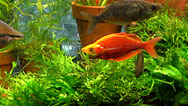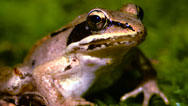Fish Surgery
- Posted 10.18.05
- NOVA scienceNOW
(This video is no longer available for streaming.) We've grown accustomed to heart surgery for dogs, chemotherapy for cats, and other variations on human-quality care of pets, but what about surgery for goldfish? Nowadays, more people in America own fish than cats or dogs, and their attitudes about these pets are changing. Correspondent Rebecca Skloot reports on the latest in veterinary medicine for our finned friends. In this emerging branch of veterinary science, there are now more than 2,000 "fish vet" specialists who are performing X-rays, ultrasounds, CAT scans, and MRIs. There are no limits other than what pet owners are willing to spend.
Transcript
Fish Surgery
PBS Airdate: October 18, 2005
The great Harvard biologist, E. O. Wilson, said one of the things that makes us special, "in good part makes us human," he wrote, "is that we have a deep, rich connection to other living things." What he calls "biophilia" the love of other organisms. And even if you get the creeps when you see a snake or a cockroach or a rat, even if there are animals that you do not like, chances are there are animals you love.
And then there are some of you—and we know who you are, because we sent our correspondent Rebecca Skloot to look—there are some of you whose love for animals is...well, why don't you see for yourself.
REBECCA SKLOOT (Correspondent): In this high-tech operating room, surgeons— some of the top in their field—prepare to remove a large tumor, probably malignant. One doctor tests the laser he'll use to burn away abnormal cells, another preps the patient for surgery. Meet Comet, a one-pound goldfish with skin cancer.
DR. GREGORY LEWBART (North Carolina State University): Well, we can't operate under water, so we put it on our anesthesia machine, where it's out of the water, then the tubes go into its mouth, and then the water, with a little bit less concentration of anesthetic, flows over the gills, and they stay asleep while we work on them. I like to look at his gills. See how nice and red they are?
REBECCA SKLOOT: Dr. Greg Lewbart runs the world's first aquatic medicine residency program, at North Carolina State University's veterinary school. It's a new field, so he and his colleagues are big on firsts: first fish laser surgery, first study on fish pain management. They even invented the machine keeping Comet knocked out.
GREG LEWBART: We can do radiographs or x-rays. We do ultrasound, CAT scans; we can even do MRIs. I don't think there are any limits on it, other than what physically can be done with that animal and then what the owners can afford or are willing to spend.
REBECCA SKLOOT: And apparently, they're willing to spend a lot, anywhere from a few hundred to a couple thousand dollars. But why pay for laser surgery on a goldfish? Comet's probably worth about 10 cents.
Here's something that might surprise you: more Americans own fish than dogs or cats these days. But what's more interesting is that people's attitudes about fish are actually changing. They're not just things you keep around the house for decoration anymore. These are pets. Companions that people bond with, care about.
Debbie Corpuz has 27 fish. Some are "rescue fish," ones she found flopping in a field after kids turned over their tank, or party favors she saved from wrongful death by toilet flushing.
Do different fish have different personalities?
DEBBIE CORPUZ (Fish Owner): Oh yes, oh yes. Some are like this guy; he's very bold and outgoing. You know, I talk to him and tell him what's going on, and he would, you know, come up to the surface and just listen to me. He really responds to people.
GREG LEWBART: I really do think there is a human-fish interaction. Fish are pretty smart. I don't think we give them enough credit a lot of times. They can be trained to do some pretty amazing things. There's a book that teaches you how to train your goldfish to swim through a hoop, to fetch, to play basketball.
So I can see that mass a lot better now.
REBECCA SKLOOT: Today there are more than 2,000 fish vets. So, if your goldfish gets a buoyancy disorder that leaves it swimming perpetually upside down, someone can implant a piece of cork on your fish's back. Like a floatation device that flips it right side up. And if your fish loses a fight, there's always glass eye implantation, to make it beautiful again.
GREG LEWBART: When someone brings their fish in to me, I look at that fish like it's their dog or it's their horse. I think if they could pick them up and hold them they would.
REBECCA SKLOOT: Dave Smothers'll tell you he really loves his fish. He raises koi, the mythical Japanese carp that fill decorative ponds. Some just look like big goldfish; others are the elegant koi he wins trophies with at fish shows. They can be worth tens of thousands of dollars. But for Smothers, it's not about the money.
DAVID SMOTHERS (Koi Owner): I would do anything I could to try to help these fish, because they are our pets, and you do attach to them emotionally.
REBECCA SKLOOT: In the summer of 2001, lightning struck near Smothers' pond, sending a violent electrical current into the water. It nearly killed Ladyfish, one of his favorites. They did a series of CAT scans. Her back was broken.
DAVID SMOTHERS: The fish certainly was going to die. There was no doubt about that.
GREG LEWBART: The decision was made to bring her to surgery, a neurosurgeon and an orthopedic surgeon. The surgeons weren't able to straighten the spine, but they were able to stabilize it using screws and wires and some surgical epoxy, or cement, that actually is implanted above the spinal column inside of the fish.
REBECCA SKLOOT: What was it that made you want to do that?
DAVID SMOTHERS: This fish would never be a show fish now, because of the deformity. I just wanted the fish to live out its natural life as best she could, swimming around with her buddies in the pond.
GREG LEWBART: When I was in veterinary school, if someone had brought their fish into the clinic for abdominal surgery, it would have, like, blown a lot of people away. Now, if I bring a fish and wheel it through the clinic, you know, it's not as huge of a deal.
REBECCA SKLOOT: Okay, so maybe fish surgery still sounds a little crazy. But think about this: in the '30s, you were crazy if you took your dog to the vet. You didn't treat those, you shot them. And in the '80s taking your bird to the vet was completely ridiculous, and now avian medicine's mainstream. So maybe 20 years from now, your grandkids will be taking their snails to the vet and saying, "Can you believe people used to flush fish down the toilet?"
Credits
Fish Surgery
- Edited by
- Ben Ehrlich
- Produced and Directed by
- Dean Irwin
NOVA scienceNOW
- Executive Producer
- Samuel Fine
- Executive Editor
- Robert Krulwich
- Senior Series Producer
- Vincent Liota
- Supervising Producer
- Andrea Cross
- Development Producer
- Kyla Dunn
- Associate Producer & Program Editor
- Win Rosenfeld
- Associate Producers
-
Mary Robertson
Anthony Manupelli
Anna Lee Strachan - Unit Manager
- Candace White
- Production Secretary
- Ayo Babatunde
- Compositing
- Yunsik Noh
- Music
- Rob Morsberger
- NOVA scienceNOW Series Animation
- Edgeworx
- Camera
-
Michael Chin
Anthony Forma
Donald Friedell
Rex Fortenberry
Mark Gunning
Scott Ransom
Edward Marritz
Daryl Patterson-Pendana
Joel Shapiro - Sound Recordists
-
Sara Chin
Jeffrey Duncan
Neal Gettinger
Janice Mahan
Mark Roy
Virnado Woods - Audio Mix
- John Jenkins
- Animation
- Sputnik
- Additional Producing
- Talleah Bridges
- Production Assistants
-
Robbie Gemmel
Shimona Shahi - Special Thanks
-
American Indian Community House
DNA 2.0
Lassen Volcanic National Park
Tika Laudun
Louisiana Public Broadcasting
Louisiana State Wildlife and Fisheries
The Melton Family
The New York Academy of Medicine Library
33rd and Bird - Archival Material
-
ABC News Video Source
BBC Motion Gallery
Getty Images
Linda Harrar Productions
Indiana State Museum and Historic Sites
Macaulay Library at the Cornell Lab of Ornithology
NASA
National Geographic Television Film Library
Prairie Pictures/Stormstock
William E. Sauro/The New York Times
WWL TV - NOVA Series Graphics
- yU + co.
- NOVA Theme Music
-
Walter Werzowa
John Luker
Musikvergnuegen, Inc. - Additional NOVA Theme Music
- Ray Loring
- Post Production Online Editor
- Spencer Gentry
- Closed Captioning
- The Caption Center
- NOVA Administrator
- Dara Bourne
- Publicity
-
Eileen Campion
Olivia Wong - Senior Researcher
- Barbara Moran
- Production Coordinator
- Linda Callahan
- Unit Manager
- Lola Norman-Salako
- Paralegal
- Richard Parr
- Legal Counsel
- Susan Rosen Shishko
- Post Production Assistant
- Alex Kreuter
- Associate Producers Post Production
-
Nathan Gunner
Patrick Carey - Post Production Supervisor
- Regina O'Toole
- Post Production Editor
- Rebecca Nieto
- Post Production Manager
- Maureen Barden Lynch
- Supervising Producer
- Stephen Sweigart
- Producer, Special Projects
- Susanne Simpson
- Coordinating Producer
- Laurie Cahalane
- Senior Science Editor
- Evan Hadingham
- Senior Series Producer
- Melanie Wallace
- Managing Director
- Alan Ritsko
- Senior Executive Producer
- Paula S. Apsell
NOVA scienceNOW is a trademark of the WGBH Educational Foundation
This material is based upon work supported by the National Science Foundation under Grant No. 0229297. Any opinions, findings, and conclusions or recommendations expressed in this material are those of the author(s) and do not necessarily reflect the views of the National Science Foundation.
© 2005 WGBH Educational Foundation
All rights reserved
Related Links
-

Fish Surgery: Expert Q&A
Veterinarian Greg Lewbart of North Carolina State University answers questions about fish medicine.
-

Veterinary Medicine for Fish
Learn how fish are treated for infectious diseases, cancer, buoyancy disorders, and freak accidents.
-

Frozen Frogs
The common wood frog freezes solid every winter and then, come spring, defrosts and mates.
-

Your Favorite Smart Animal
Hear experts "pitch" for dogs, cats, honeybees, hyenas, and other smart species, then vote for your favorite.
-

Dogs Decoded
How smart are dogs, and what makes them such ideal companions?



